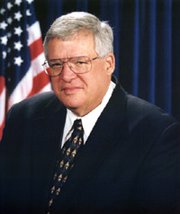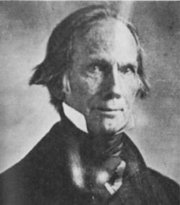Speaker of the United States House of Representatives
|
|

The Speaker of the House of Representatives is the presiding officer of the United States House of Representatives. The Speaker is currently second (after the Vice President) in line to succeed to the U.S. presidency in the case of death or resignation of the President. The Speaker of the House ranks fifth in the United States order of precedence.
The current (since January 6, 1999) Speaker is Republican Dennis Hastert of Illinois.
| Contents |
Selection and role

The office is provided for in the United States Constitution in the second section of the first article, which states:
- "The House of Representatives shall chuse [sic] their Speaker and other Officers..."
In practice, the speaker is always chosen from amongst sitting house members (to date, all Speakers have been members of the House), but this is not strictly required by the Constitution. The speaker is almost always elected along strictly partisan lines, and is thus a member of the House's majority party. A Representative who does not vote for his or her party's leader as Speaker may be deprived of committee assignments. Once elected, a Speaker is sworn in by the Dean of the House.
The Speaker is considered a partisan officer, unlike the nonpartisan Speaker of such bodies as the British House of Commons. While there is a majority leader in the House of Representatives, he is in fact the second highest officer of the majority, and the Speaker is in fact the functioning leader of the majority. However, it is customary for the Speaker not to vote, unless his vote is necessary to pass a bill.
Role in "Loyal Opposition"
SamRayburn55.jpg
The speaker of the House is ceremonially the highest ranking legislative official in the United States government. He is generally a well-known national figure, and thus a human "face" on the legislative branch.
Since the Speaker and the President are often from different parties, this can sometimes lead to situtations in which the two officials are at odds with each other. The Speaker can thus come to be seen as the leader of the "opposition", the symbol of his party, and the very personification of partisan opposition to the President's agenda. Recent examples of this include Newt Gingrich, who fought a bitter war for control of domestic policy with Bill Clinton, and Tip O'Neill, who sought to restrain Ronald Reagan. When the President is from the party which controls the House of Representatives, the Speaker normally takes a somewhat less prominent role in public affairs; in recent times, Speaker Dennis Hastert has played a very low-key role.
The Speaker is also a much more politically active figure than many of his counterparts in other countries. Although he has little formal power, throughout American history the speakership has evolved into one of the nation's key political positions. The latent potential power of the Speakership was first developed by Henry Clay, and reached its apogee nearly a century later under Joseph Cannon.
Speakers of the U.S. House of Representatives, 1789–present
| Speaker | Party | State | Term of service |
|---|---|---|---|
| 1. Frederick A.C. Muhlenberg | Federalist | Pennsylvania | 1789–1791 |
| 2. Jonathan Trumbull, Jr. | Federalist | Connecticut | 1791–1793 |
| 3. Frederick A.C. Muhlenberg | Democratic-Republican | Pennsylvania | 1793–1795 |
| 4. Jonathan Dayton | Federalist | New Jersey | 1795–1799 |
| 5. Theodore Sedgwick | Federalist | Massachusetts | 1799–1801 |
| 6. Nathaniel Macon | Democratic-Republican | North Carolina | 1801–1807 |
| 7. Joseph Bradley Varnum | Democratic-Republican | Massachusetts | 1807–1811 |
| 8. Henry Clay | Democratic-Republican | Kentucky | 1811–1814 |
| 9. Langdon Cheves | Democratic-Republican | South Carolina | 1814–1815 |
| 10. Henry Clay | Democratic-Republican | Kentucky | 1815–1820 |
| 11. John W. Taylor | Democratic-Republican | New York | 1820–1821 |
| 12. Philip Pendleton Barbour | Democratic-Republican | Virginia | 1821–1823 |
| 13. Henry Clay | Democratic-Republican | Kentucky | 1823–1825 |
| 14. John W. Taylor | Democratic-Republican | New York | 1825–1827 |
| 15. Andrew Stevenson | Jacksonian | Virginia | 1827–1834 |
| 16. John Bell | Whig | Tennessee | 1834–1835 |
| 17. James Knox Polk | Democratic | Tennessee | 1835–1839 |
| 18. Robert Mercer Taliaferro Hunter | Whig | Virginia | 1839–1841 |
| 19. John White | Whig | Kentucky | 1841–1843 |
| 20. John Winston Jones | Democrat | Virginia | 1843–1845 |
| 21. John Wesley Davis | Democrat | Indiana | 1845–1847 |
| 22. Robert Charles Winthrop | Whig | Massachusetts | 1847–1849 |
| 23. Howell Cobb | Democrat | Georgia | 1849–1851 |
| 24. Linn Boyd | Democrat | Kentucky | 1851–1855 |
| 25. Nathaniel Prentiss Banks | American/Republican | Massachusetts | 1856–1857 |
| 26. James Lawrence Orr | Democrat | South Carolina | 1857–1859 |
| 27. William Pennington | Republican | New Jersey | 1860–1861 |
| 28. Galusha A. Grow | Republican | Pennsylvania | 1861–1863 |
| 29. Schuyler Colfax | Republican | Indiana | 1863–1869 |
| 30. Theodore Medad Pomeroy | Republican | New York | 1869 |
| 31. James G. Blaine | Republican | Maine | 1869–1875 |
| 32. Michael C. Kerr | Democrat | Indiana | 1875–1876 |
| 33. Samuel J. Randall | Democrat | Pennsylvania | 1876–1881 |
| 34. J. Warren Keifer | Republican | Ohio | 1881–1883 |
| 35. John Griffin Carlisle | Democrat | Kentucky | 1883–1889 |
| 36. Thomas Brackett Reed | Republican | Maine | 1889–1891 |
| 37. Charles Frederick Crisp | Democrat | Georgia | 1891–1895 |
| 38. Thomas Brackett Reed | Republican | Maine | 1895–1899 |
| 39. David B. Henderson | Republican | Iowa | 1899–1903 |
| 40. Joseph Gurney Cannon | Republican | Illinois | 1903–1911 |
| 41. Champ Clark | Democrat | Missouri | 1911–1919 |
| 42. Frederick H. Gillett | Republican | Massachusetts | 1919–1925 |
| 43. Nicholas Longworth | Republican | Ohio | 1925–1931 |
| 44. John Nance Garner | Democrat | Texas | 1931–1933 |
| 45. Henry T. Rainey | Democrat | Illinois | 1933–1934 |
| 46. Joseph Wellington Byrns | Democrat | Tennessee | 1935–1936 |
| 47. William Brockman Bankhead | Democrat | Alabama | 1936–1940 |
| 48. Samuel Taliaferro Rayburn | Democrat | Texas | 1940–1947 |
| 49. Joseph William Martin, Jr. | Republican | Massachusetts | 1947–1949 |
| 50. Samuel Taliaferro Rayburn | Democrat | Texas | 1949–1953 |
| 51. Joseph William Martin, Jr. | Republican | Massachusetts | 1953–1955 |
| 52. Samuel Taliaferro Rayburn | Democrat | Texas | 1955–1961 |
| 53. John William McCormack | Democrat | Massachusetts | 1961–1971 |
| 54. Carl Albert | Democrat | Oklahoma | 1971–1977 |
| 55. Tip O'Neill | Democrat | Massachusetts | 1977–1987 |
| 56. Jim Wright | Democrat | Texas | 1987–1989 |
| 57. Thomas Stephen Foley | Democrat | Washington | 1989–1995 |
| 58. Newton L. Gingrich | Republican | Georgia | 1995–1999 |
| 59. J. Dennis Hastert | Republican | Illinois | 1999–present |
See also
- "Prime Minister of the United States"
- Speaker
- Minority Leader of the United States House of Representatives
External link
- The role of the Speaker (http://speaker.house.gov/features/role.asp) - from speaker.house.gov
